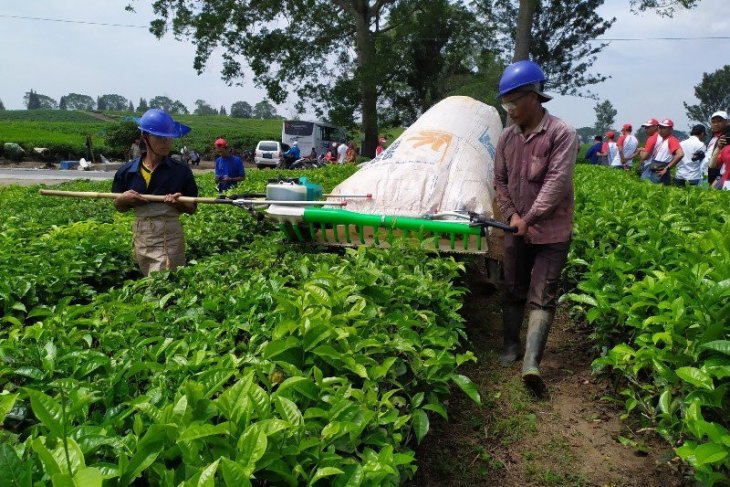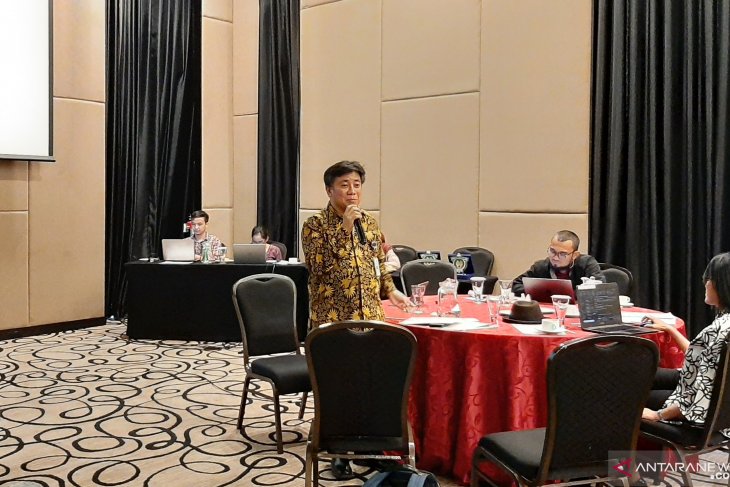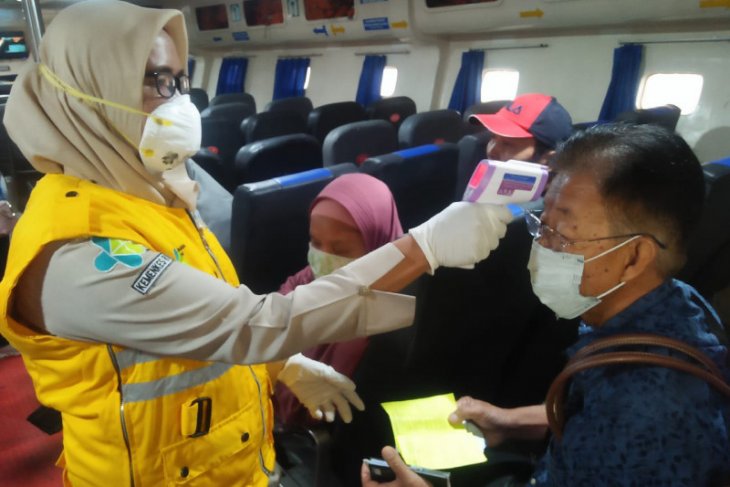Live Streaming
Program Highlight
Company Profile

Ani Hasanah
Jokowi Welcomes Indonesia-Netherlands' Cooperation in Various Sectors
President Joko Widodo (Jokowi) welcomed bilateral cooperation between Indonesia and the Netherlands in various fields, including the business sector, which has offered several agreements worth some US$ 1 billion dollars, or approximately Rp14.3 trillion.
The agreements, including those on sustainable palm oil, women's issues, peace and security, and infectious disease control, have already been signed, President Jokowi said during a joint press conference with Dutch King Willem-Alexander at the Bogor Palace on Tuesday.
Warmly welcoming the state visit of King Willem Alexander and Queen Maxima, President Jokowi said the Netherlands is one of Indonesia's important and strategic partners on the European continent in the trade, investment and tourism sectors.
At the joint-press conference, King Willem Alexander said his state visit was joined by representatives of more than 100 Dutch companies who offer opportunities to strengthen business and investment cooperation with their Indonesian counterparts.
The Dutch Embassy in Jakarta announced earlier that some 180 representatives from 130 Dutch companies and educational institutions joined a parallel economic mission during the state visit of King Willem-Alexander and Queen Máxima to Indonesia from March 9 to 13.
The economic mission to Jakarta and Surabaya was led by Netherlands Minister for Foreign Trade and Development Cooperation Sigrid Kaag, Minister of Infrastructure and Water Management Cora van Nieuwenhuizen, Minister of State Sybilla Dekker, and Vice Minister of Agriculture, Nature, and Food Quality Jan Kees Goet.
The Netherlands was also keen to partner with Indonesia to create smart solutions in solving global challenges. Both Indonesia and the Netherlands face common challenges in various fields, the Dutch embassy said in a press statement.
Among these challenges are the impact of climate change on coastal protection and water resources, the accessibility of healthcare, the shift to a circular economy, and increasing pressure on food production systems.
"This mission will offer opportunities for companies and institutions of the two countries to exchange knowledge and expertise in finding smart and innovative solutions together," the Dutch embassy said.
During their five-day visit, the participating representatives of the Dutch enterprises and educational institutions focused on boosting cooperation with their Indonesian counterparts in five sectors.
The five sectors include agriculture and food, life sciences and health, maritime, integrated coastal zones and water management, circular economy, water technology, as well as aviation.
Indonesia and the Netherlands have a longstanding economic relationship through mutual trade and investments. This mission aims to strengthen existing economic ties between the two countries and provide a platform for new economic opportunities.
As part of the scheduled programs, on Tuesday a Netherlands Trade Dinner, expected to be joined by some 500 Dutch and Indonesian businesses and educational institutions, was held in Jakarta's Shangri-la Hotel Jakarta.
In terms of bilateral trade and investment, the Netherlands is important for Indonesia because it is the fifth-largest investor and trading partner, which has allowed Indonesia to enjoy a surplus of trade.
This was noted by Dutch Ambassador to Indonesia Lambert Grijns when he received eight Indonesian journalists who visited the Netherlands from February 15 to 21. Indonesia's surplus of trade was recorded at EUR1,806 million (2019).
At the same time, with a total investment of US$2.6 billion, the Netherlands is also the fifth largest investor in Indonesia, behind Singapore ($6.5 billion), China ($4.7 billion), Japan ($4.3 billion), and Hong Kong ($2.9 billion).
In the tourism sector, the contribution of the Dutch to Indonesia's foreign tourist arrivals is considerable because, last year alone the Indonesian Embassy in Den Haag noted there were 202,116 Dutch travelers who visited Indonesia.
During their 17-day length of stay in 2019, Dutch tourists spent some US$1,866, on average. (ANTARA)
March

Workers picking tea leaves at the Bah Burung Tea Plantation, which will be the location for the 2020 National Tea Festival held on March 13-15, 2020.(ANTARA)
Tea lovers in Nagori Bah Butong I, Simalungun district, North Sumatra, will celebrate the Nusantara Tea Festival at Sidamanik Tea Plantation from March 13 to 15, 2020.
The festival will set up 1,200 tents to accommodate some 3,000 participants, Chairman of the Nusantara Tea Festival Nikson Faisal Sitohang said here on Tuesday.
Participating in the festival will be 40 communities from various areas in North Sumatra province and Aceh province.
Besides being the largest tea producer, Bah Butong in Sidamanik district also has tourist attractions, including ponds and waterfalls, as well as beautiful nature, Sitohang said.
He noted that during the festival, participants will learn about tea plants, tea production, and brewing tea.
Participants will also take a tour, enjoy some artistic and cultural entertainment, and draw lottery prizes.
Sitohang said he is optimistic that the three-day festival will have a positive impact on the economy of the local community.
For this reason, people were asked to open food and souvenir stands for visitors at the festival.
Sitohang also expressed his hope that sellers can offer reasonable prices and will not take too much profits at the festival.
"It is more about how to make the visitors feel satisfied and comfortable while visiting Sidamanik, and such satisfaction would make visitors come back here again," he stated. (ANTARA)
March

Environment Director of the National Development Planning Agency (Bappenas) Medrilzam during a discussion held in South Jakarta on Tuesday (ANTARA)
The development of the new capital city in East Kalimantan will encourage environmental conservation in the province, the Environment Director of the National Development Planning Agency (Bappenas), Medrilzam said. "We have the spirit to improve the ecosystem there. This is great momentum. Moreover, President Joko Widodo has committed himself to turn it into a forest city, and a sustainable and green city. This is a great chance to green the region again," she said at a discussion held in South Jakarta on Tuesday.
The government has decided to remove the seat of government from Jakarta to East Kalimantan. The new capital city will be built on 180 thousand hectares of land in Sepaku, North Penajam Paser District and Samboja, Kutai Kartanegara District, East Kalimantan.
The government plans to move the capital city to East Kalimantan in 2024.
The preparatory stage of the development of the new capital city has been started this year, including a master plan.
The development of the new capital city will offer a good chance to develop a wide range of natural vegetation as well as to re-green the location of the new capital city, she said.
If everything goes as planned, the environment in the new capital city will no longer be a problem since environmental conservation tops the list of the government's priorities in the city’s planned development, she said.
"There should no longer be a question about the environment of the new capital city since it is the first thing we will conserve. We all, not only the President but other parties as well, are committed to developing the new capital city into a livable city, she said.
March

The Indonesian Consumers Foundation (YLKI) has urged the government to install thermal scanners at all departure terminals for both domestic and international flights at all airports across the country to prevent the spread of novel coronavirus disease (COVID-19).
"At the moment, the government has just installed the thermal scanners at the areas of arrival terminals for international flights," YLKI Chairman Tulus Abadi said in a press statement that ANTARA received in Jakarta on Tuesday.
The presence of those thermal scanners would create a sense of security and comfort for passengers, cabin crew, and other people at the airports so that their mobility would not be disrupted by the threats of COVID-19, he said.
Since the early stages of COVID-19 outbreak, the airport authorities in Singapore, Hong Kong, and Chinese cities have installed thermal scanners, he added.
The Indonesian government has put in place precautionary measures since the early stage of the coronavirus outbreak that first struck the Chinese city of Wuhan at the end of December 2019.
In addition to installing thermal scanners at the country's airports and seaports, as well as making preparations at hospitals across the archipelago, the Indonesian government repatriated several hundred citizens.
On February 2, 238 Indonesian nationals were airlifted from Wuhan, China, to then be quarantined in Natuna District's Riau Islands Province. All of these Indonesians were found to be healthy and reunited with their families.
The Indonesian government also repatriated 188 Indonesians employed as crew members of the cruise ship World Dream Liner, and 69 Indonesians employed as cabin crew on the Diamond Princess cruise ship.
The World Dream cruise ship's crew members and 69 cabin crew of the Diamond Princess had been sent to Sebaru Kecil Island, Jakarta's Thousand Islands, for a 14-day quarantine.
On March 2, 2020, President Jokowi declared that two Indonesians had tested positive for COVID-19. They were quarantined in an isolated room at the Jakarta-based Sulianti Saroso Infectious Diseases Hospital.
The deadly virus outbreak, which has spread to 109 countries and territories around the world, has claimed at least 4,000 lives – most of whom are in China – and infected over 113,000 people worldwide.
The Indonesian authority has reported that there have been 27 confirmed COVID-19 cases within the country, as of Tuesday.


